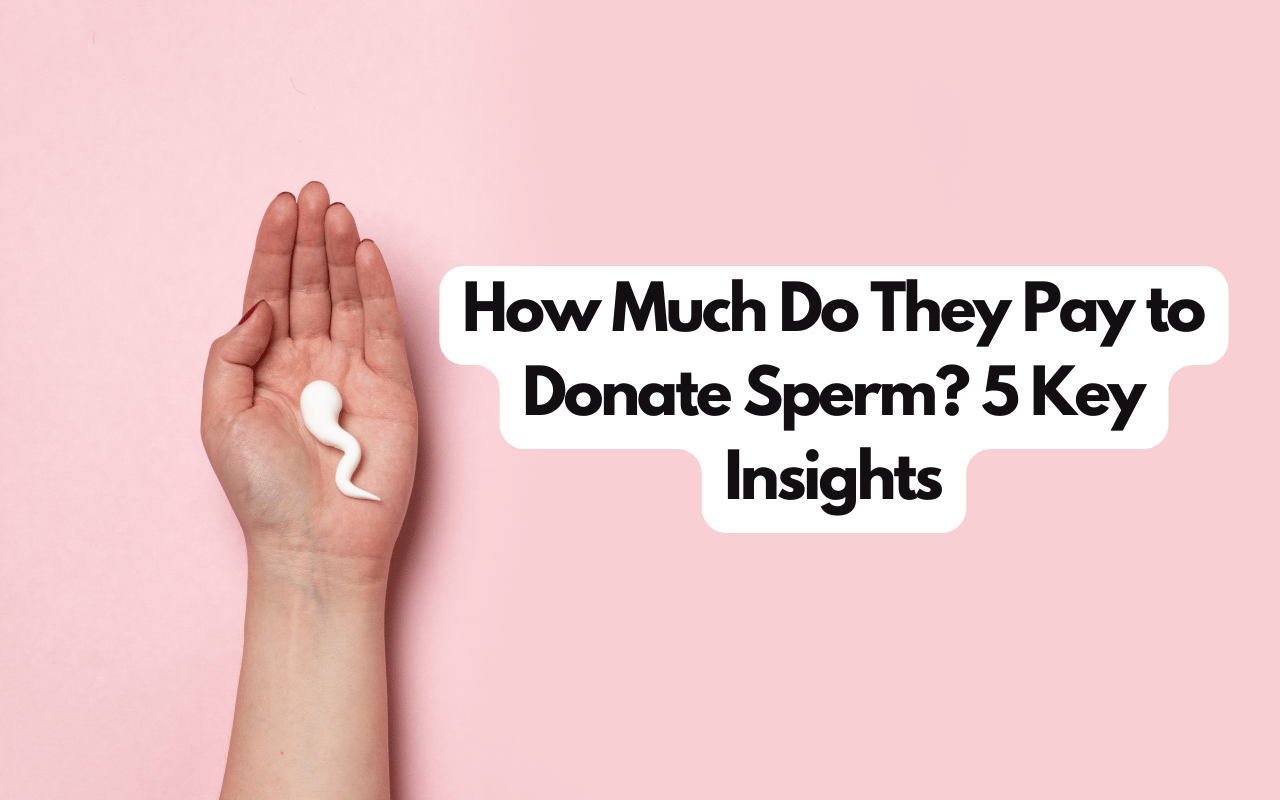How Much Do They Pay to Donate Sperm? 5 Key Insights

Learn about the sperm donation process, financial compensation guidelines, donor requirements, income impact, and ethical considerations. Discover what you need to know before donating.
- How Much Do They Pay to Donate Sperm? 5 Key Insights
- Sperm Donation Process
- Financial Compensation Guidelines
- Requirements for Donors
- Impact on Donor's Income
- Ethical Considerations
- Frequently Asked Questions
Are you curious about sperm donation and its financial aspects? Sperm donation involves healthy men donating sperm to help individuals or couples with infertility. In this blog post, we’ll cover the process, compensation guidelines, requirements for donors, income impact, and ethical issues.
We’ll explore how much you can earn from donating sperm and clarify financial aspects. Whether you’re considering becoming a donor or just curious, this post will provide essential insights into sperm donation and its financial implications. Join us to understand the ethical and financial considerations of sperm donation.
Sperm Donation Process
When considering becoming a sperm donor, it’s important to understand the process involved. The first step is usually finding a reputable sperm bank or fertility clinic to work with. Once you’ve chosen a facility, you’ll need to complete an application and undergo a thorough screening process, which may include medical, genetic, and psychological evaluations.
After approval as a donor, you’ll provide semen samples for testing and storage. These samples help assess sperm quality and screen for genetic or infectious diseases.
If accepted, you’ll sign a contract detailing the terms of your donation and any financial compensation. Remember, sperm donation is usually voluntary and altruistic, with payment varying by facility and circumstances.
Financial Compensation Guidelines
When considering sperm donation, a common question is how much compensation you’ll receive. Understanding the financial aspect helps in making an informed decision.It is important to note that the financial compensation guidelines for sperm donation vary by location and sperm bank. In general, sperm donors can expect to receive financial compensation ranging from $35 to $125 per donation. This compensation is typically provided as a way to cover the time and effort involved in the donation process.
It’s also important to understand that some sperm banks may offer additional compensation for donors who meet specific criteria, such as having a high sperm count, desirable physical characteristics, or a successful track record of previous donations. It’s essential to thoroughly research and inquire about the specific compensation guidelines at the chosen sperm bank before proceeding with the donation process.
When it comes to the financial compensation received for sperm donation, it’s crucial to keep in mind the ethical considerations. Donors should not view compensation as their primary motivation for donating sperm. The decision to become a sperm donor should be based on the desire to help individuals or couples in need of assisted reproduction, rather than the financial gain. It’s important to approach sperm donation with the right intentions and understanding of the impact it can have on the lives of others.
| Location | Financial Compensation Range |
|---|---|
| New York | $50 – $100 |
| California | $60 – $125 |
| Texas | $35 – $80 |
- Research and understand the financial compensation guidelines for sperm donation at the chosen sperm bank
- Recognize that financial compensation should not be the primary motivation for becoming a sperm donor
- Keep in mind the ethical considerations and the impact of sperm donation on the lives of others
Requirements for Donors
When considering becoming a sperm donor, there are several requirements that potential donors must meet in order to be eligible. These requirements are in place to ensure the health and safety of both the donor and any potential recipients of the donated sperm. First and foremost, donors must be in good physical and mental health. This means passing a thorough medical examination and providing a detailed medical history to the sperm bank or fertility clinic. Additionally, donors must be within a certain age range, typically between 18 and 39 years old. This age range is considered the optimal window for fertility and overall reproductive health.
Another crucial requirement for sperm donors is the absence of hereditary or genetic diseases. Donors usually undergo genetic testing to screen for potential health issues.
In addition, donors might need to provide a detailed family medical history to check for any underlying health problems.
Donors must also agree to regular medical check-ups and provide updated health information. They may need to be available for contact from donor-conceived offspring once they reach a certain age. These steps ensure transparency and accountability in the donation process.
Impact on Donor’s Income
When it comes to sperm donation, potential donors often wonder about the financial compensation and its impact on their income. The truth is that the financial compensation for sperm donation can vary widely depending on several factors, including the location of the sperm bank, the donor’s health and fertility history, and the demand for donors. While some sperm banks may offer a flat fee for each donation, others may compensate donors based on the number of donations they make or the quality of their sperm.
Sperm donation should not be viewed as a reliable source of income. The IRS does not classify it as employment or self-employment.
Donors often report earnings as reimbursement for their time, effort, and expenses. This includes costs like travel. Compensation typically covers these aspects rather than acting as regular income.
Additionally, there are ethical considerations to take into account when it comes to the financial impact of sperm donation. Donors should not view the compensation as their primary motivation for donating sperm. Instead, they should consider the potential impact of their donation on the lives of individuals and families who are seeking to start or expand their families. While the financial compensation may provide some benefit to donors, the real impact of sperm donation lies in the opportunity to help others fulfill their dreams of parenthood.
Ethical Considerations
Consider the ethical implications of sperm donation for the donor, recipient, and any resulting children.
Informed consent is crucial. Donors must fully understand the donation’s consequences. Recipients need to know the donor’s medical history and any potential risks.
Another ethical consideration is the confidentiality of all parties involved. Donors, recipients, and any resulting children have the right to privacy regarding their involvement in the sperm donation process. This includes protecting the donor’s identity and ensuring that any resulting children have access to information about their genetic heritage, if desired.
Overall, transparency and ethical conduct are crucial when it comes to sperm donation. Both donors and recipients should be fully aware of the potential emotional and psychological implications of their decisions, as well as any legal and social implications. By addressing these ethical considerations, the sperm donation process can uphold the rights and well-being of all involved parties.
Frequently Asked Questions
Is donating sperm legal?
Yes, in most countries and states, donating sperm is legal and regulated by specific laws and guidelines.
How much do sperm banks pay?
The compensation for donating sperm varies, but it can range from $50 to $200 per donation.
What are the requirements to donate sperm?
The requirements to donate sperm typically include being within a certain age range, passing medical and genetic screenings, and having a healthy lifestyle.
Can I donate sperm anonymously?
Yes, many sperm banks offer the option to donate sperm anonymously. This means the donor’s identity will not be disclosed to the recipient.
How often can I donate sperm?
Sperm donation frequency depends on the policies of the sperm bank, but it is typically limited to a certain number of times per month or year.
Are there any health risks associated with donating sperm?
Donating sperm is generally considered safe, but there can be minor risks such as bruising or discomfort at the donation site.
What happens to the sperm after donation?
After donation, sperm is processed, frozen, and stored for future use by individuals or couples needing fertility treatments.






